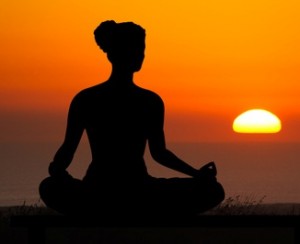
This is a continuation of Bob Weisenberg’s essay: Six Big Ideas Of Yoga. This is the sixth of the Six Big Ideas:
The techniques of Yoga, leading to enhanced awareness, are one method for discovering our true wondrous nature.
You might have noticed that I haven’t even mentioned Yoga techniques so far, except in passing. This is because, while they clearly have a lot of value in themselves, the techniques are also the means to a philosophical end.
The poses, meditation, and breathing techniques of Yoga all have a central aim–to move toward enhanced awareness. Enhanced awareness is non-judgmental, egoless witness of ourselves and our emotions. It is what allows us to experience the full spectrum of consciousness–the universe and the “universe within”. Enhanced awareness is how we experience more fully all the wonder and awe I have been talking about.
If you are unfamiliar with Yoga, try this deceptively simple Yoga approach to see what I mean:
Focus on the current moment – what’s going on right now at this moment.
Breathe deeply, relax all the muscles in your body.
As a thought or feeling enters your mind, let yourself feel it as deeply as it goes (whether it is a regret about the past, a worry about the future, or just a neutral thought).
Accept and completely allow yourself to have that feeling.
Mentally step out of yourself and watch that feeling as though from the outside.
Gently focus back on the present moment.
You can see this is the opposite of “positive thinking”, which involves pushing yourself to think certain positive thoughts, and to push out all negative thoughts.
In contrast, Yoga philosophy involves not trying to think anything in particular, and not controlling your thoughts at all, except to gently focus on the present moment, or to focus your mind on one particular thing. This is actually not that easy to do at first, hence the many branches of Yoga that teach a variety of techniques. With time and habit, however, it becomes truly effortless.
When we are able to do this, the magic often just happens on its own because we truly are all already indescribably wondrous (“divine” if one feels comfortable with the term). The wonder becomes obvious when we pay relaxed attention to what’s going on right now, both within us and around us.
You might find, as I have, that this simple habit eventually starts to bring out the amazing nature of everyday existence, without the often counter-productive effort associated with trying too hard to “figure things out” or searching for something outside ourselves to “turn us on”.
Most other Yoga techniques are just expansions and variations of this present-focused philosophy. Poses help us become more aware of our bodies in the present moment. Meditation helps us get into the present moment more and more deeply. Breathing exercises get us in touch with our most primal source of energy–our breath.
Some Yoga techniques have you focus for an extended period of time on just one thing, anything. It could be your breath, or your heartbeat, or a mantra, or a single leaf on a tree (or even a paper clip, I guess). By focusing so completely on one thing, you not only become super aware of your object of concentration, but also kind of clear out your brain to be more receptive to every other sensory perception.
Other Yoga techniques are the opposite–they expand your awareness to take in everything at once instead of a single thing. I call it “ultra-awareness”. You become very still and allow yourself to be ultra-sensitive to all the immediate sights, sounds, and feelings around you.
Yoga techniques can have a strong impact on everyday emotions. My own experience, paradoxically, is that I tend to feel an emotion more directly and strongly than I did pre-Yoga, but I don’t struggle with it as much.
This is because, while I’m struggling with it, I can often shift into non-judgmental awareness, and this helps me see the struggle in perspective, and thus deal with it better without diluting it or avoiding it.
In this way, Yoga enhances and informs all our human feelings and actions. It does not replace them or mask them.
If you decide to delve deeper into Yoga, you need to pick and choose what is most meaningful and useful for you. The whole picture can be overwhelming and intimidating. The insights you get are more important than the specific practices you adopt. And, even though it has a sprawling 5,000 year old history, ultimately Yoga needs to be about simplicity, not complexity.
Next week: Conclusion.
Related:
Six Big Ideas Of Yoga
Each Of Us Is Already Wondrous!
Our Wondrous Nature Is The Same As The Wondrous Universe!
Fully Experience The Present Moment
The Mind, The Body, And The Spirit Are Inseperable
Experiencing Wondrous Self Leads To Abundance
